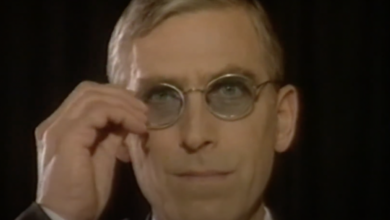Sian Clifford: ‘The scripts that I get sent are never my age’

Sian Clifford is not sure what the worst way to die would be. “I guess none of us know,” says the actor matter-of-factly, displaying an enduring pragmatism that calls to mind her breakout character, Claire, the sister in Fleabag, Phoebe Waller-Bridge’s wonderfully wicked series that propelled its writer and cast to comedy glory. Clifford won a Bafta for her performance.
But back to the current morbid topic. It’s perhaps a fittingly gloomy one given the storm raging outside both our windows (“Nothing like being indoors while it’s thundering!”); it’s also a natural question to ask considering Clifford’s latest role in BBC Two’s Life After Life, an adaptation of Kate Atkinson’s novel of the same title.
The four-part series, set in England across the two world wars, stars Clifford as Sylvie, stoic mother to Ursula (Thomasin McKenzie). Her daughter has the bad luck of dying at various stages in life, only to be reborn over and over, put through life’s wringer again and again. Stillbirth; influenza; car crash; defenestration; botched surgery; murder. Ursula seemingly cannot escape this especially grim brand of deja-vu. Sylvie can be cruel, but she is at heart just a mum trying her best. She joins a growing cohort of onscreen mothers daring to be flawed. “There is an overwhelming notion that mothers can’t be anything less than perfect. And women, to be honest, I think are perceived in that same way too,” says Clifford. Life After Life is her biggest part yet, and one she confesses to being extremely anxious about. “I want to be good in it, to do the character justice,” she says.
Her nerves are unnecessary. In a way, Sylvie is a perfect embodiment of Clifford’s appeal: as an actor, she excels in restraint. Beneath the dour demeanour of her characters simmers a stew of emotions. You can sense Clifford under the iciest surface, vulnerable and empathetic. We witnessed this skill firsthand in Fleabag, in which she played the scene-stealing sister of Waller-Bridge’s titular character. As Claire, Clifford was pivotal in many of the show’s sharpest scenes. “I look like a pencil!” is a highlight, as is her cheerful life advice: “I take all the negative emotions; I bottle them and bury them and they never come out. I’ve basically never been better.”
Clifford’s talent for deadpan comedy didn’t go unnoticed. Since then, many of her roles have shared the same description: stern, tight-lipped lady. And although her follow-up part in Quiz was more quietly dramatic than laugh-out-loud hysterical, her performance as Diana Ingram – one half of the couple accused of cheating their way to the top prize on Who Wants to Be a Millionaire? in 2001 – contained comic notes of Claire. As did her portrayal of the tough-as-nails mum to Maisie Williams in Sky One’s off-grid survivalist drama Two Weeks to Live. Sylvie in Life After Life is yet another ball of tension. But Clifford doesn’t see her roles as similar at all. “I suppose they are,” she eventually concedes. “There is probably something tightly wound about a lot of them but if they were to unravel, they would spin off in very different directions as women.”
It is not hard to see Clifford herself as one such spin-off. The actor carries a whiff of Claire, Sylvie and Diane about her. “I’m psychotic with a spreadsheet!” she declares, sipping diligently from a water bottle throughout our conversation. Later, the actor later apologises for the “chaos” in the background, gesturing over her shoulder to what can only be described as a perfectly ordered bookshelf. But at other times, Clifford displays something far less expected: a new age-y openness to alternate lives and reincarnation. Two things that her typically no-nonsense characters would scoff at.
“I do feel like there is a version of my life in which I’m a ballerina,” says Clifford, who took dance classes as a child. “I’m always told I have ballerina’s feet.” She throws her head back with a guttural, very un-Claire laugh. Indeed, a ballerina’s life might’ve awaited Clifford – and her high arches – had she been able to tolerate her “horrible” teacher. “I’m really allergic to bullies and people who are unkind. Even as a five-year-old, I knew I didn’t have to put up with this,” Clifford says, adding she had the same problem during her brief stint in Brownies. “If you have to strip someone else of their power in order for you to be powerful, you’re in big trouble and you need some help. Especially if you’re doing it to a child!”
Clifford is a living, breathing, acting testament to the advice that if you fail, try again. And then once more. The actor auditioned for a place at London’s Royal Academy of Dramatic Arts three times before she was finally accepted. She never once thought of giving up, an early example of her steely resolve. For her third audition, Clifford performed a monologue from Joan of Arc; she pulls the exact copy out from a shelf above her head to show me the annotations she scribbled in the margins when she was 20 (“No one needs to see what I’ve written there!” she cackles). By then, Clifford knew – almost inexplicably – that she would get in on that third try. “I have a lot of moments in my life where I feel a very, very deep intuitive knowing. And that was one of them. I can’t really expand any more than that. It is a knowing.”
It was at Rada that she met Waller-Bridge. “We met on day one but became friends on day three,” says Clifford. She had been initially “wary” of Waller-Bridge because they were both from Ealing, but “different parts” of Ealing, adding that “we definitely had different kinds of upbringings”. She laughs, “I don’t know why I’d hold it against her that she was from my part of town.” Clifford doubts Waller-Bridge – “the most accepting, non-judgemental person I’ve ever met” – had the same reservations. Their friendship was forged on the London Underground, on the Central line back home from class. “At the end of that 45-minute journey, I knew that this was one for life. I don’t have another friendship like it.” Clifford is most effusive when talking about her co-stars: whether it is “my beloved” James McArdle who plays her husband in Life After Life, or Matthew Macfadyen, her onscreen partner in Quiz and “the nicest man in all of England”. Of Saoirse Ronan, with whom she stars in the forthcoming thriller See How They Run, Clifford cannot be more complimentary. “She really is the greatest actor in a generation.”
Clifford wears her heart on her sleeve. “I’m like a tap, to be honest,” she says. “It’s harder for me not to get emotional in scenes. I’m trying to rein that in because it’s not always helpful.” But the tap proved helpful when shooting Life After Life. Throughout the series, we see Ursula’s multiple births, ergo Sylvie’s multiple labours, a number of which end in stillbirth. The birth scenes alone took two days to film. “It was daunting,” recalls Clifford. Seeing her telegraph pain so palpably, you wonder if she is mining some personal tragedy of her own – but the actor insists she isn’t. “I have to imagine it’s actually happening. It has to be authentic,” she says. “That’s not to say I’m a method actor at all because I don’t advocate for that.” And anyway, she adds, “I don’t think there is any scenario equivalent to a stillbirth.”
Clifford dreamt of being an actor before she was able to articulate it. At six years old, she was watching her sister’s am-dram performance of The Little Mermaid when she came to the sudden realisation that she was meant to be on stage. Clifford then entered the am-dram world, but “thrived” in private. “It wasn’t something that anyone knew about. I didn’t have a great time at school so I kept my head below the parapet,” she says, turtling her neck between her shoulders.
Although Clifford mostly grew out of this childhood aversion to an audience – a career in acting necessitates that – nothing could prepare her for the spotlight that Fleabag brought. “I’m not going to lie, it was intoxicating being in that environment,” she recalls. “But the fact it happened later in my life and that I did it with my friend helped keep me grounded.” Nevertheless, Clifford says she is “still dealing with own neuroses” surrounding her career. “I know that the pressure I feel is a fiction – and as soon as I remind myself that, it disperses. But there’s definitely a part of me that is still like, ‘Are you sure that I should have a seat at this table?’”
That incredulity was crystallised in Clifford’s 2020 Bafta acceptance speech, in which she tripped over her words with charming bemusement. Honestly, she hadn’t expected to win. And not in the way that every actor says they didn’t – Clifford genuinely thought she didn’t stand a chance. “The one thing worse than not winning an award is winning an award and not having anything to say,” she says now, hands to her cheeks in shock-horror like an Edvard Munch painting incarnate. “I was gobsmacked.”
The actor has kept her feet on the ground throughout everything. The fame. The awards circuit. The general hoopla of it all. As she said, it’s partly thanks to finding fame later in life. That is, if mid-thirties counts as late, which it inexplicably does in the entertainment industry. Clifford says she feels the sharp jab of ageism now more than ever. “The scripts that I get sent are never my age,” she says. “I always get scripts for characters in their late forties or fifties. I know it sounds silly but I just don’t feel that inside. I still feel very young-spirited.” Clifford tries to take it as an endorsement; after all, it’s true that she is remarkable at conveying the sort of sensibility associated with adulthood. “I try not to take offence and treat it entirely as a compliment that I get these older parts, but I’ve certainly noticed it more now.” It being, you know, “the age thing”. Part of the problem, she explains, is that there are so few parts for the in-between stage of a woman’s life. “There’s the matriarchal character or the young hot one. There’s very little in the middle,” she says. The exception is almost always with “stuff written by women”.
Although Clifford sees her roles as being different at their core, the actor is still itching to do something totally new. “I’m longing for a part that is a bit wilder. Something a bit more unhinged,” she says. “I’m really desperate to play a villain. Or someone who is utterly authentically joyful.” Over the course of one conversation, it becomes clear that Clifford is the latter – despite what her stony-faced characters may suggest. “I’m just incredibly enthusiastic,” she grins.
Clifford speaks fondly of her ‘Quiz’ co-star Matthew Macfadyen, ‘the nicest man in England’
‘Life After Life’ debuts on BBC Two on Tuesday 19 April at 9pm. All four episodes will be available to watch on BBCiPlayer
‘We met on day one [of drama school] and became friends on day three,’ Clifford says of her long-time friendship with ‘Fleabag’ creator Phoebe Waller-Bridge





